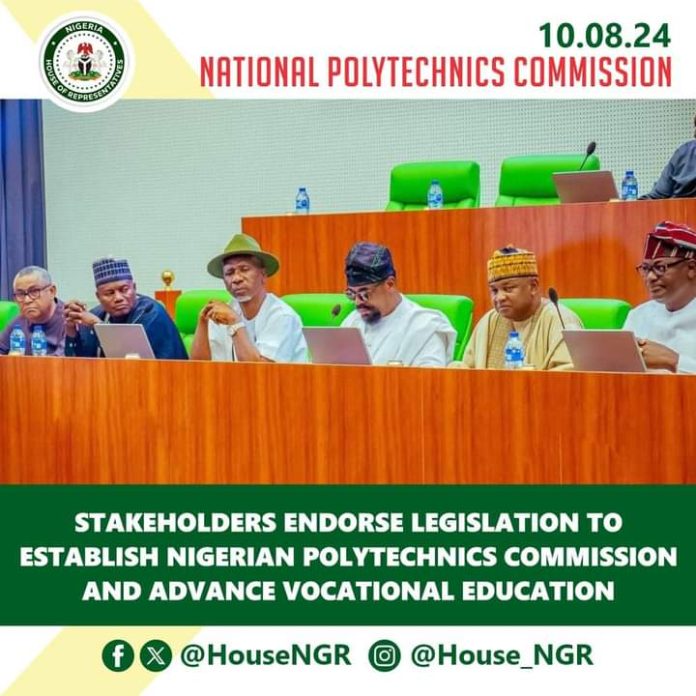The House of Representatives has reaffirmed its commitment to improving the quality of education and fostering excellence within Nigeria’s tertiary institutions.
Speaker of the House of Representatives, Rt. Hon. Abbas Tajudeen, expressed this commitment on Wednesday at the National Assembly Complex in Abuja during a public hearing on a bill proposing the establishment of a National Polytechnic Commission, which is designed to supervise, regulate, and coordinate polytechnic education across Nigeria.
The hearing, organised by the House Committee on Federal Polytechnics and Higher Technical Education, also sought stakeholder input on two additional bills.
The bills aim to establish the Federal Vocational and Entrepreneurship Institute in Lagos State and the Federal Vocational and Skills Acquisition College in Yankaba, Kano State. These initiatives are part of a broader effort to advance vocational and polytechnic education in the country.
Represented by Hon. Jesse Okey-Joe Onuakalusi (LP, Lagos), Speaker Abbas opened the hearing by highlighting the growing recognition of technical and vocational education as crucial to national development.
He emphasised that by establishing these institutions, the House aims to ensure that high-quality education in science, technical skills, arts, and vocational training is accessible to all Nigerians.
“Today’s hearing perfectly aligns with our legislative agenda to improve Nigeria’s educational framework. In a rapidly evolving global landscape, it is crucial that we equip our youth with skills and knowledge that are both globally competitive and locally relevant.
“The proposed agency and institutions will stand as pillars of excellence, delivering high-quality education that adheres to international standards while addressing the specific needs of our communities,” Speaker Abbas stated.
Chairman of the Committee, Hon. Faud Kayode Laguda (APC, Lagos), explained that the public hearing is a procedural step toward the passage of the bills into law.
He noted that each bill is designed to improve Nigeria’s socio-economic development and promote sustainable human capital development necessary for building a self-reliant society.
“As you are aware, the establishment of vocational, entrepreneurship, and skills acquisition institutions in Nigeria aims to train technicians and middle-level personnel who will act as catalysts for rapid industrialisation and the development of our real sector,” Rep. Laguda said.
Stakeholders at the hearing unanimously supported the need for a regulatory body for polytechnics, lamenting the inability of the National Board for Technical Education (NBTE) to oversee over 700 institutions effectively.
Chairman of the Senate Committee on Tertiary Institutions and TETFund, Senator Muntari Dandutse (APC, Katsina South), stressed the importance of developing educational programmes that benefit future generations and assured that the Senate would expedite the relevant bills.
Permanent Secretary of the Federal Ministry of Education, Nasir Sani-Gwarzo, praised the House for the timely introduction of the proposed legislation, expressing full support for the initiative as a means to align Nigerian polytechnics with international standards.
Prof. Idris Bugaje, Executive Secretary of the NBTE, described the proposed Polytechnic Commission as a long-overdue necessity. He noted that other education sectors already have specialised regulatory bodies and expressed optimism that the new commission would provide a robust regulatory framework and curriculum to enhance skills and productivity.
In separate submissions, major polytechnic unions also supported the establishment of the commission.
The Academic Staff Union of Polytechnics (ASUP), represented by Comrade Shammah Kpanja, welcomed the move as a step towards promoting quality education, relevant skills, research, and innovation. He emphasised the need for government commitment and collaboration with stakeholders to achieve Nigeria’s educational and economic goals.
Prof. Aliyu Mamman, Chairman of the Conference of Federal Polytechnics in Nigeria, attributed the sector’s challenges to the absence of a commission and called for the withdrawal of a recently released scheme of service by the Office of the Head of the Civil Service of the Federation, which he argued has exacerbated existing problems.
The three bills under consideration were sponsored by Rep. Idu Igariwey (PDP, Ebonyi), Rep. Jesse Okey-Joe Onuakalusi (LP, Lagos), and Rep. Hassan Shehu Hussain (NNPP, Kano), respectively.













